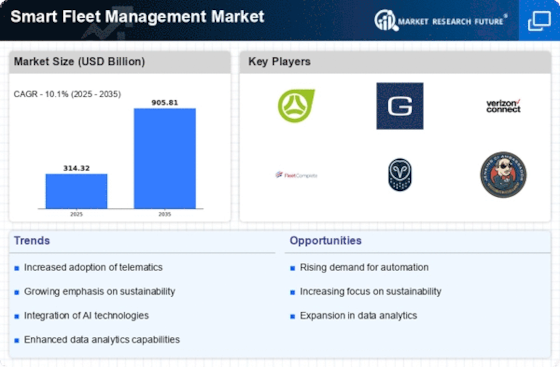Market Analysis
In-depth Analysis of Smart Fleet Management Market Industry Landscape
The way we travel has a big impact on the environment, and changing how we move around is crucial for using energy more efficiently worldwide. Right now, transportation uses more than half of the world's energy and contributes about 25% of the carbon dioxide emissions from burning fuel. The energy efficiency of transportation is measured by how much fuel is used per distance traveled, and the type of transportation (like roads, trains, or planes) plays a role in how efficiently energy is used. Trains, especially electric ones, are considered the most energy-efficient way to travel. They are way more efficient than cars, trucks, or planes. Trains are not only good for the environment, but they also save a lot of energy and are safer too.
Trains are known to be two to five times more energy-efficient than other ways of travel, like roads, shipping, or flying. They have been around for a long time and are still one of the best ways to move things and people efficiently. Freight trains, which carry goods, are much more energy-efficient than trucks, and one freight train can replace hundreds of trucks on the road. This is not only good for saving energy but also reduces traffic and makes transportation safer. People are also increasingly choosing trains for travel because they are faster, safer, and less harmful to the environment than cars or planes. Railway companies are working to make trains even more energy-efficient, which not only helps the environment but also saves money and brings many benefits to society.
Compared to cars or planes, trains use much less energy to transport passengers. In fact, passenger trains use only 1% of the energy needed for passenger transportation. This is because trains are a great way to move many people at once. Electric trains are even better as they are more efficient, reliable, and cheaper to maintain than trains that use diesel fuel. In places like Europe, most trains are powered by electricity, and they have lower carbon emissions compared to other means of transportation. Trains are a key part of reducing the carbon footprint in the transportation sector, and the demand for more energy-efficient transportation is expected to boost the global rolling stock market in the future. With more people living in cities and the increasing impact of climate change, there is a growing need for eco-friendly train systems. Innovations in making trains more energy-efficient and the rising preference for trains in emerging economies will likely increase the demand for energy-efficient transportation in the coming years.


















Leave a Comment